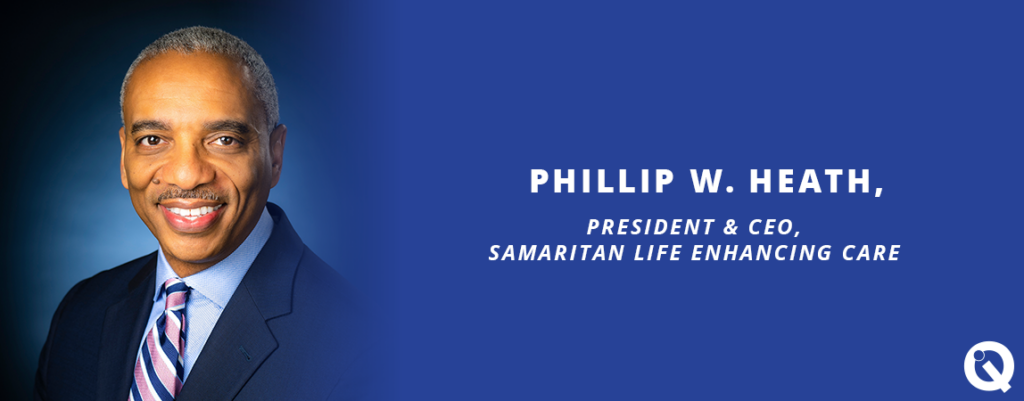Phillip W. Heath, President and CEO of Samaritan Life Enhancing Care, the not-for-profit health care provider offering hospice care, grief support, palliative medicine, and primary care at home. The organization is a member of the Quality Institute’s Provider Council.
About a year ago, your organization changed its name from Samaritan Health Care & Hospice to Samaritan Life Enhancing Care. What is behind the change?
We have expanded our services beyond hospice and palliative care and now also provide primary care services at home. We do blood draws, podiatry … the full complement of services. We have physicians and nurse practitioners who provide house calls, eliminating the inconvenience and stress associated with frequent trips to the primary care office and improving the overall health care experience.
What do you see as the barriers to people seeking hospice and palliative care?
I’ve been working in end-of-life care for over 30 years now, and the barriers continue in different ways. One barrier is that people refer to hospice and palliative care very late in their health care trajectory. And we understand that the phrase “hospice” — the consideration of no longer being treated — creates fear and trepidation in some individuals. But what people don’t understand fully is that the earlier you call, the more we can help. And that’s because our physicians, social workers, spiritual care coordinators, nurses, and volunteers provide an interdisciplinary approach. When people see that, they recognize the value.
I’ll use an example. Since February 18, former president Jimmy Carter has been in hospice. He’s receiving support and help in that time. But research shows that 37 percent of people do not elect hospice until the last seven to 14 days of care. It’s very difficult to make a tremendous impact in that time. We do the best we can, and often what we hear from people is, “I wish I had called you sooner.”
As the new CEO, what do you see as your top priorities?
Three areas: our people, our service and technology, and our affiliations and partnerships. For our people, it’s cultivating our culture of advanced clinical expertise and extraordinary compassion — and excelling in talent development, additional training for our managers and staff, and making sure that, as a new CEO, we don’t lose the culture, quality, and compassion that we’ve had for years.
As for service and technology, we want to let people know we visit people in the home who are not on hospice, as I mentioned. And recently we launched a social isolation program through our friendly caller program.
And lastly, we have long-standing partnerships with health systems, long-term care providers, and health care providers, but now we’re also partnering with faith and community-based communities, such as the Camden Coalition, Servicios Latinos de Burlington County, and the Jewish Federation. And we’ve expanded the Boccolini Institute for Education, Research and Innovation, named after our retired president and CEO Mary Ann Boccolini, to pursue innovative advancements in hospice and palliative care.
You have long been involved in the Quality Institute’s Conversation of Your Life (COYL) program. How does that partnership advance your mission?
We are very honored to work with the COYL program since its inception. It has allowed us to help patients in our communities express their goals of care in their treatment and quality of life in a broader way. Working with the Quality Institute has helped us advocate for advance care planning, which is the hallmark of the COYL program, and we are honored to be a part of that. We look forward to continuing to participate for years to come.
We like to ask a question beyond people’s personal lives. Who is your favorite New Jersey artist?
It is my son, Joshua Heath. He has a music production company that he started right out of Temple University. It’s a burgeoning organization, and he is an amazing artist, musician, and music producer. I guess I am his biggest cheerleader.

